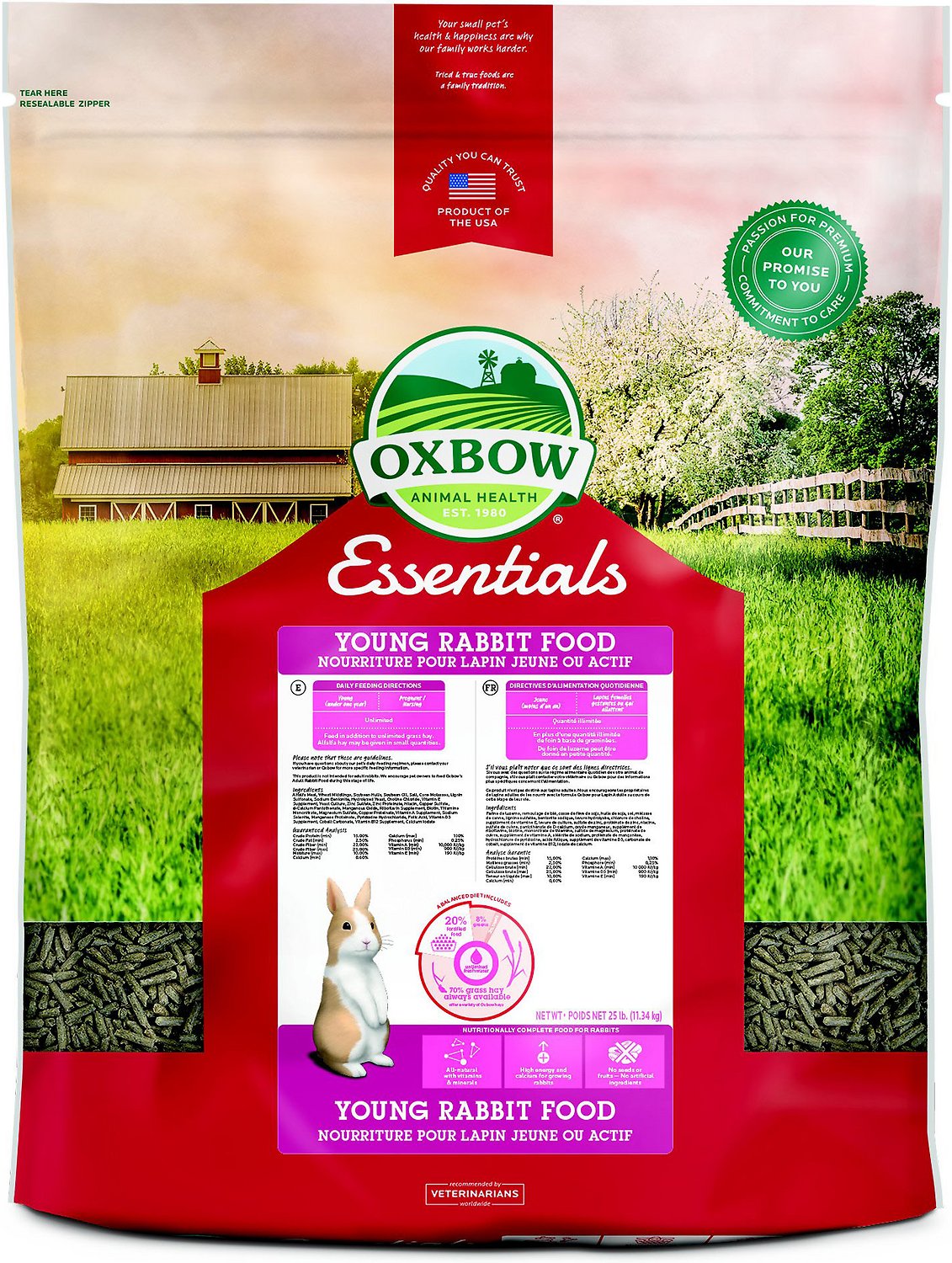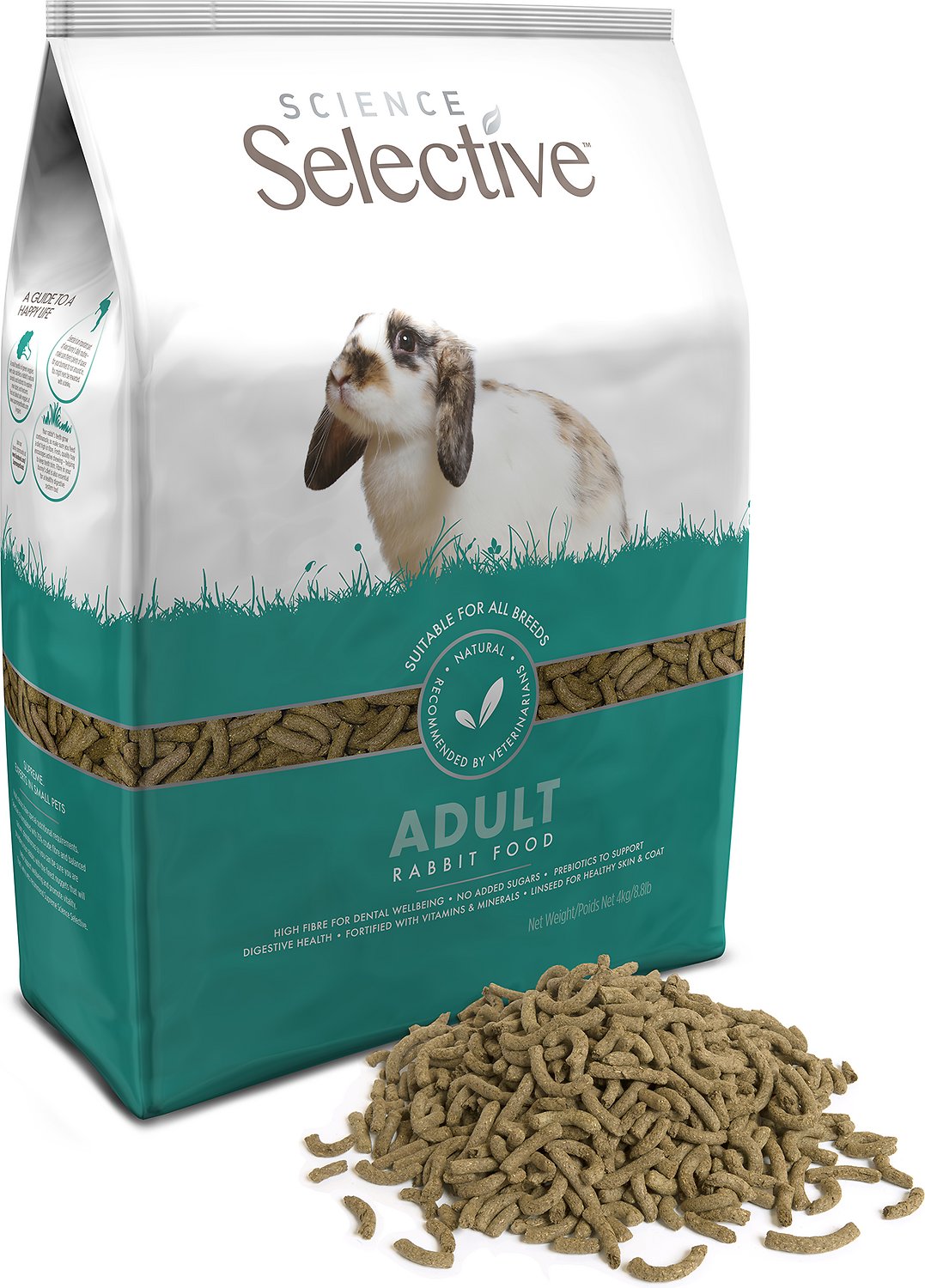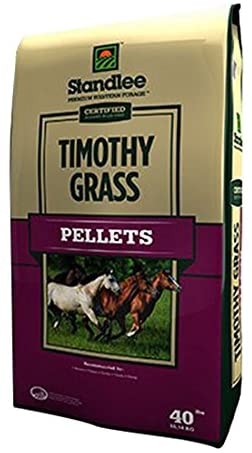Best Rabbit Pellet Brands in 2020
Without finding the right thing to eat for your rabbit, you should simply bag the idea of keeping your pet happy and healthy. Rabbits need nutritious food to grow, but in most cases, hay alone isn't going to help. You'll have to find other alternatives to make it more exciting for your rabbit. What does a rabbit eat? Knowing the answer to this question will surely help you devise a diet plan, but here are some options to help you choose the best rabbit pellets brand.
The Best Rabbit Pellets: Our Top Picks
1. Oxbow Bunny Basics
If you're looking for a widely appreciated brand of rabbit food, Oxbow has to be the choice. These pellets are quite impressive because they maintain a good balance of nutrition. While they don't rely on grass hay, they contain alfalfa to provide your rabbit with a good dose of fiber and protein. Similarly, it also contains wheat and soy, which add more carbs and fiber to the blend.
The taste is quite impressive, which is why you can easily make it a part of your rabbit's diet. In terms of price, this rabbit food will also impress you a lot. The only thing you might need to consider is that it comes with some filler ingredients, which lower its quality to a certain extent, but that's not going to prove a deal-breaker either.
PROS
CONS
2. Small Pet Select Rabbit Food Pellets
Available in different package sizes, it's easy to find the right package as per the needs of your rabbit. Buying a smaller package may be a better choice if you're just introducing this rabbit food for the first time. Let your rabbit get used to it before going big on stock.
This rabbit food is popular because it offers a good dose of fiber and protein to your small animal. It's equally suitable for adult rabbits who need a set amount of minerals and vitamins to stay healthy.
As it's made in the USA, you don't have to worry about the quality. It uses GMO-free ingredients, which is why it works for rabbits with any digestive issues. Overall, it's a great choice, but understand that it's hard to buy it offline.
PROS
CONS
3. Standlee Hay Company Timothy Pellets
Originally created for horses, these pellets work just perfectly for your adult rabbits as well. The reason is that it's just as good as feeding timothy hay or grass to your small animal.
It comes in a large packaging, but it means it's going to last for a long time too. Being a larger package, it becomes a lot more economical to buy at the same time. You're going to love it if you believe hay is the best choice for rabbits, as it's free of any binders, fillers, and even alfalfa.
In terms of nutrition, they deliver impressive results, but you need to bear in mind that you may want to try something else if you're looking for pellets that would help fatten up your small animal.
PROS
CONS
FAQ - A Buyer's Guide
Finding the best rabbit food often depends on the current age of your rabbit and what they're eating already. It's not a good idea to switch to a rabbit food just because you've read some positive reviews or it has worked for some other rabbit owner. You need to be careful when selecting adult rabbit food and introduce it slowly to your pet to ensure they don't develop any serious complications. When looking for the right food for rabbit, timothy hay or timothy grass is surely going to be the go-to option, but so many small pet owners now switch to easy-to-feed pellets. Let's find out a bit about food rabbit likes and food your rabbit needs to stay healthy.
What is the Best Rabbit Food to Buy?
When selecting foods for your adult rabbit, it is important to prepare a diet plan for your rabbit that is balanced in nutrients, and to get all the nutrients in the right proportion for your rabbit, your best bet is to go for the good quality commercial pellets. Take note that your rabbit requires a never-ending supply of fresh hay as the pellets are a small part of their daily diet.
Here are the essential elements of an adult rabbit diet:
Natural good quality ingredients: The first and foremost ingredient should be hay, and should have natural ingredients instead of low quality substitutes.
- Complete and balanced. When choosing your rabbit food, the most important thing to check is that all required nutrients are available.
- Various Forms of hay. For baby rabbits, Alfalfa hay is a good choice as it is rich in protein; however timothy hay is also good for the digestive system and so are timothy-based pellets, which suit the adults best.
- Fiber rich content. 18% fiber or above is recommended for rabbit pellet, as fiber is essential for the digestion of your rabbit.
- Age wise protein content. Little rabbits need high dosage of protein in their diets, while for adults 12% to 16% protein is sufficient.
What Should I Look for in Rabbit Pellets?
If you're willing to do your research to find food rabbit would love, rabbit pellets have to be an option. Of course, other hay-based food options are available, but pellets are easy to feed and become an essential part of your rabbit diet. Here are a few things to check when buying rabbit pellets:
- Fiber. Fiber helps with digestion and the more the better, however 18% is the minimum amount of fiber a pellet should have.
- Protein. 12-14% protein content is enough for average rabbits, however 16% is ideal for younger ones.
- Fat. 5% is the maximum amount of fat content a pellet should contain, the lesser the better, with 2.5% being ideal.
- Calcium and Phosphorus. The ratio of calcium and phosphorus must be proper, and the calcium should not be more than 1%.
Be cautious about choosing rabbit pellets without any corn in the ingredients. Some brands have a small percentage of corn in them, and while corn itself is not harmful to rabbits, it is likely to facilitate the growth of a kind of mold that is lethal for rabbits.
Always choose pellets that are even and regular in terms of size and texture and the best pellets for rabbit food are green in color and have a fresh scent. This is important, as sometimes manufacturers may accidentally place feed of some other livestock instead of rabbit feed pellets. You will not come across any renowned manufacturer to make bad pellets on purpose, but still it is better to know what to look for.
Take note of the percentages of protein and fiber in the rabbit feed pellets. In most cases, 16% protein in a pellet is sufficient for raising rabbits, and is the minimum requirement for tissue growth in the younger rabbits. For a rabbit nursing her babies, 18% protein in pellets is required, minimum, to produce milk, and same is the case with a pregnant doe, for her to be able to provide nutrients for the litter she is carrying.
It all comes down to the nutritional value of foods for rabbit, and the same holds true for pellets, which need to come with maximum amounts of fiber. Be sure to check the manufacturing date to be not older than 2 months, as rabbits prefer fresher pellets.
Are Pellets Bad for Rabbits?
No, in fact pellets are essential for rabbits, especially when they are young. The first couple of months after they are born, rabbits can consume as many pellets as they want, and there is no harm in that.
Pellets, as a rabbit food, can benefit the young rabbits greatly, as they provide calcium and protein and are rich in calories which assist your rabbit in growth and development in terms of weight and muscle.
In spite of these benefits, fresh vegetables and hay are more important and vital for rabbit feed.
While some rabbits love pellets, they are not a compulsory part of the diet. Pellets are usually loved by rabbits, but they are avoidable in a rabbit’s diet.
As your rabbit grows towards maturity, the pellets from her diet should be lowered as pellets are rich in calories and your rabbit may end up with extra weight if pellet consumption is not managed properly.
The calcium and protein requirements of adult rabbits are much less than baby rabbits as excess may actually be unsafe for them. Therefore, pellets need to be reduced and more hay needs to be included gradually into the feed of rabbits as they grow. Fiber is the main source of nutrient required by adult rabbits.
Sometimes rabbits may get tired of consuming pellets and you can always try out a new brand or dip the pellets in something sweet to make them like it. Have a private space for feeding rabbits, and keep pellets out of their reach most of the times, as scarceness will make the pellets more fascinating to them.
While pellets may not be essential for a rabbit’s diet plan, however if you see a dramatic change in your rabbit where they stop eating pellets all of a sudden, check out what may have caused this change in appetite.
What can Rabbits Eat Instead of Pellets?
You can skip the pellets from your rabbit’s diet, provided you can come up with a diet plan that balances their need of minerals, carbohydrates, protein, fiber and fat.
The foremost part of the rabbit food must be alfalfa hay, which can be consumed as much as they want. However, if you are unable to find non-GMO grade alfalfa, then timothy grass can be used in combination with protein rich feeds.
Alfalfa and timothy hay can be supplemented with a number of different greens and branches grown locally and organically, without any pesticides such as fruits and vegetables in measured balance.
Grass hay and clippings are a good choice as are grains and grain hays. You can check out some flowers and herbs as well as berries, leaves and branches of some select trees which will actually help in exercising the teeth and keeping them even.
Some of what you may choose may only be available in certain seasons, and that is perfectly fine, as you have a lot of options to choose from, and really don't need to limit your rabbit's diet to grass hay. You will need to learn a little bit about safe plants and identify which ones are edible in order for you to choose the best supplement for your rabbit, such as black oil sunflower seeds.
Since green forages are rich in water content, ranging from 65% to 90%, your rabbit will be well hydrated and will not be demanding water that much. However, these can be used only in the months when you can have access to fresh green produce.
The baby rabbits can eat anything a doe can consume, and there are two reasons for this. First, the intestinal flora of the doe has the capacity to balance itself to be able to handle the fodders she consumers, and the same flora population is passed down to the babies once they are born. The second reason is that there is a less chance of the babies experiencing diarrhea due to the consumption of pellets with high food count.
The Best Rabbit Pellets to Buy
With the kind of nutrition they offer, rabbit pellets are surely one of the best rabbit food options to consider. You just need to make sure the pellets are fresh and rich in fiber and other nutrients. If you're confused, you may want to buy Small Pet Select Rabbit Food Pellets, which contain GMO-Free ingredients and make sure to keep your pet healthy.
About the Author Steven
Related Posts
Is It More Cost Effective To Build Your Own Aquarium?
DOT Announces Upcoming Changes for ESAs and Plane Travel
Best Cleaning Tips for Your Aquarium
Best Waterless Shampoos for Your Dog
Best Muzzles for Your Pit Bulls
Best Indestructable Dog Kennels in the Market Right Now




